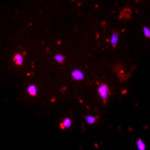Citicoline induces angiogenesis improving survival of vascular/human brain microvessel endothelial cells through pathways involving ERK1/2 and insulin receptor substrate-1
Main Article Content
Abstract
Background
Citicoline is one of the neuroprotective agents that have been used as a therapy in stroke patients. There is limited published data describing the mechanisms through which it acts.Methods
We used in vitroangiogenesis assays: migration, proliferation, differentiation into tube-like structures in Matrigel™ and spheroid development assays in human brain microvessel endothelial cells (hCMEC/D3). Western blotting was performed on protein extraction from hCMEC/D3 stimulated with citicoline. An analysis of citicoline signalling pathways was previously studied using a Kinexus phospho-protein screening array. A staurosporin/calcium ionophore-induced apoptosis assay was performed by seeding hCMEC/D3 on to glass coverslips in serum poor medium. In a pilot in vivostudy, transient MCAO in rats was carried out with and without citicoline treatment (1000 mg/Kg) applied at the time of occlusion and subsequently every 3 days until euthanasia (21 days). Vascularity of the stroke-affected regions was examined by immunohistochemistry.
Results
Citicoline presented no mitogenic and chemotactic effects on hCMEC/D3; however, it significantly increased wound recovery, the formation of tube-like structures in Matrigel™ and enhanced spheroid development and sprouting. Citicoline induced the expression of phospho-extracellular-signal regulated kinase (ERK)-1/2. Kinexus assays showed an over-expression of insulin receptor substrate-1 (IRS-1). Knock-down of IRS-1 with targeted siRNA in our hCMEC/D3 inhibited the pro-angiogenic effects of citicoline. The percentage of surviving cells was higher in the presence of citicoline. Citicoline treatment significantly increased the numbers of new, active CD105-positive microvessels following MCAO.Conclusions
The findings demonstrate both a pro-angiogenic and protective effect of citicoline on hCMEC/D3 in vitroand following middle cerebral artery occlusion (MCAO) in vivo.
Article Details
How to Cite
KRUPINSKI, Jerzy et al.
Citicoline induces angiogenesis improving survival of vascular/human brain microvessel endothelial cells through pathways involving ERK1/2 and insulin receptor substrate-1.
Vascular Cell, [S.l.], v. 4, n. 1, p. 20, dec. 2012.
ISSN 2045-824X.
Available at: <https://vascularcell.com/index.php/vc/article/view/10.1186-2045-824X-4-20>. Date accessed: 19 feb. 2026.
doi: http://dx.doi.org/10.1186/2045-824X-4-20.
Section
Original Research

